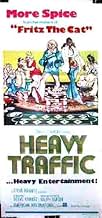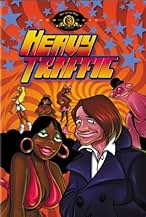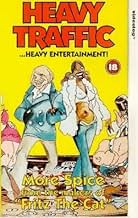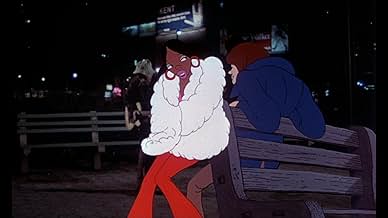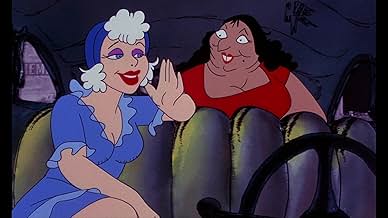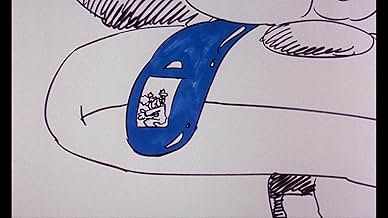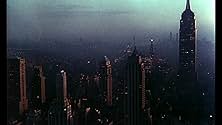Adicionar um enredo no seu idiomaAn underground cartoonist contends with life in the inner city, where various unsavory characters serve as inspiration for his art.An underground cartoonist contends with life in the inner city, where various unsavory characters serve as inspiration for his art.An underground cartoonist contends with life in the inner city, where various unsavory characters serve as inspiration for his art.
- Angelo "Angie" Corleone
- (narração)
- Ida Corleone
- (narração)
- Molly
- (narração)
- Rosalyn Schecter
- (narração)
- Rosa
- (narração)
- Crazy Moe
- (narração)
Avaliações em destaque
First, the animation: I know a lot of people find it charming, but it stinks. Yes, there are a few good sequences and some clever parts, but 95% is just crude and terrible. It's something that would have been much better if put into live action. Why animate something when it would be easy to show it live?
Second, the story. Where the hell is it? An "underground animator" (how cliche) hates his life and then goes out to become a pimp? Are you kidding me? There is no semblance of plot or logic. I know it's a "fantasy world" and all but that doesn't forgive Bakshi of not having any kind of plot whatsoever. A pathetic excuse for a script.
Thirdly, the stereotypes. Gays, blacks, Jews, Italians, the handicapped, everyone is fair game. And while I wasn't offended by these creations per se, I just found them lazy and uninteresting. Is there anything that separates Bakshi's Jewish mother from any other stereotype of a Jewish mother that you've ever seen?
I found this film a complete waste of time.
I would suggest (okay, I AM suggesting) that a lot of Anime, and the useage of animated clips in both Natural Born Killers and Kill Bill (vol. I) point back to this particular film.
My take: watching the hero in "real time" is what the film is showing, with the animated bits being more inside of his head, until the end, where he is blown off by the beautiful woman that he dreams of, where we see one event that exists in his head (notice that it fails, but begins with an act of violence against the pinball machine, and also notice that the man playing with the artificial gunfighter is gunned down while a man >?< is getting naked in the photo booth) and another that ends with a sense that in a few seconds the Mary Tyler Moore theme song is going to begin.
What is real? Well, in the head of someone that creates movies held by the only boundries made inside one's own head, it is a pointless question...
Heavy Traffic must've been controversial back in '73, and caused quite a splash. But I really don't see why. This is a case where, if the movie had been made completely as live-action, no one would mention it today. The rambling and sometimes incomprehensible plot, extremely stereotyped characters, and subtle-as-a-Mack-Truck "social commentary" would've consigned this to a celluloid footnote.
Some of the animated sequences are clever, but without a strong plot and good characters, I found them to be interesting, but not compelling.
Another reviewer said that people who review this film poorly are either offended by the nudity or just do not get it. The nudity (and blood) do not bother me in the slightest -- fill the screen with as many animated sex organs as you feel necessary, for all I care. On the second point, it is possible I do not get it.
While I understand the animation was innovative for its time and that the film shows urban decay -- both with cartoons and actual locations -- I cannot help but think that it just has not aged very well. Some scenes I found excellent (such as the God segment), while others were completely forgettable. It balanced out to be average at best.
The New York Times called it the "most original American film of the year." Could they look back now and say that again? I am not so sure.
Você sabia?
- CuriosidadesHalf way into production as Bakshi was fired (before being re-hired). A different director stepped in and animated a train sequence in which Michael goes to visit his brother-in-law. He is on a subway and witness' a woman sleeping while two men begin to undress her. Michael just watches. As the woman wakes up, she screams "rape" toward Michael. This was in the original script, but was scrapped when Bakshi returned to the project, as he felt the scene was in bad-taste.
- Citações
Moe: Hey, It's Michael Corleone! What's you doin' now?
[makes pigeon noises]
Moe: What's you doin' now?
Michael: Hey, crazy man! How come you're not down in your basement?
Moe: Well, I, I came to kill your pigeon, boy.
Michael: Ah, that's bullshit, Moe, you're probably peekin' down at the ladies.
Moe: Yeah! My peekin' days long shut down, Michael.
[sadly]
Moe: I ain't there no more. I just ain't there.
[plays his harmonica]
Michael: Ah, you're just a crazy nigger, Moe. Just a goddamn crazy nigger.
Moe: We's all niggers, boy! Ha ha! You an' me, just goddamn crazy niggers! We's all niggers boy. Most of us don't know it yet.
Michael: [passing a joint to Moe] Hey, listen, you want some of this shit?
Moe: Even your pigeon's a nigger! Ha ha ha ha ha! That's why I'm gonna kill him.
Michael: Moe, you ain't gonna do shit!
Moe: Moe: I just ain't there. Every - everybody plays like they there... but they ain't there. I ain't there. Your pigeon ain't there! He flies high like he there, but he don't fly 'less you open that cage. And he got to come back 'cause he's trained to! He ain't there.
- Versões alternativasIn 1974, the film was cut and rereleased with an "R" rating, replacing the previous "X" rated version.
Principais escolhas
- How long is Heavy Traffic?Fornecido pela Alexa
Detalhes
- Data de lançamento
- País de origem
- Central de atendimento oficial
- Idiomas
- Também conhecido como
- Starker Verkehr
- Locações de filme
- Empresas de produção
- Consulte mais créditos da empresa na IMDbPro
Bilheteria
- Orçamento
- US$ 950.000 (estimativa)
Contribua para esta página




